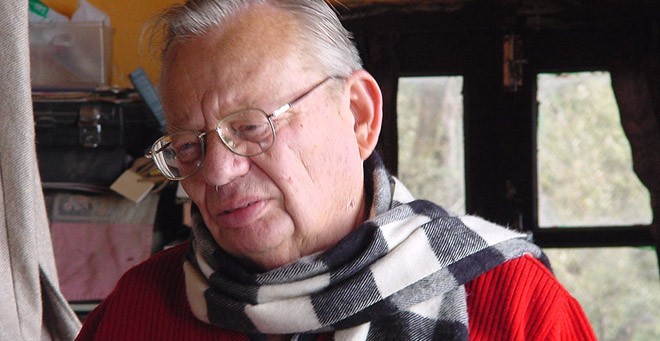

Ruskin Bond will turn 80 this May. He began writing at the age of 17 and his first published novel The Room on the Roof won the John Llewellyn Rhys prize for 1957. Ruskin Bond comes from an interesting clique of writers. Namely, writers of British descent who made India their home.
Among these, writers like Paul Scott, whose work Staying On is a story on the aftermath of the partition of the subcontinent. Another book, Bhowani Junction by John Masters is more resonant with the backdrop of the eve of 1947. Similarly, M.M. Kaye’s stories of the raj still hold a haunting beauty. And among them, Bond stands apart for his Anglo-Indian identity.
Anglo Indians were arguably the backbone of the Empire and many studies have been carried out analysing their role in the establishment of the Empire. In spite of the controversy regarding this title of ethnicity, Ruskin Bond has preferred to call himself an Indian.
Bond’s writing has mostly concentrated on the small town India where everyone knows everyone else by their first name, their surname and through mutual relatives. The foothills of the Himalayas, Mussoorie, Shamli and Dehradun, are the mainstay of his writing, where according to Bond he lived and smelled and absorbed the mountains. An interesting comparison can be made between his work and that of R.K. Narayan whose famous work Malgudi Days was filmed as a serial for Doordarshan.
People like Nathu the cleaner, the washer man, the nosy neighbour, the small town barber throng the stories of Bond. Through their simplicity, the stories acquire a subtle nuance that is a pleasure for the reader. When the bank goes bankrupt because of the cleaner, or a little boy talks to the gardener and the ayah, these small town lives with their myriad concerns come alive in a way that creates a very real nostalgia in the reader: of long lazy afternoons when fans slowly whir, sunlight filters through rough curtains into bare whitewashed walls and one is lulled to sleep by the mere drone of bees and dragon flies.
These are stories of once-upon-a-time when all children lived in small town worlds no matter how sprawling the city. When in one’s own mind, the universe ended beyond the third lane from one’s house. Where children want to grow up and become engine drivers, or tag along after their elders firing away questions on why trees grow and where do fireflies come from.
This concern with childhood and with children is manifested throughout most of his work. Ruskin Bond has been duly noted for his contribution to children’s literature. He won the Sahitya Akademi Award in 1992 for Our Trees Still Grow in Dehra. His work is representative of a lot that happens in a child’s life. The insecurity of not knowing what your elders may do for their actions are totally inscrutable to one and the unutterable fear children may experience in world, which can be frequently hostile through no fault of one’s own, are themes that creep into his writing. On the brighter side, so do pet monkeys and friendly pythons.
In a lovely story about a tiger cub, grandpa ends up patting a ferocious animal and comes off unscathed from the ordeal. In another, he mentions the food that his grandmother cooks, the breakfasts she makes with scrambled eggs and the roasts she cooks for lunch prove to be an irresistible draw upon an impecunious relative. His children’s writing does not caricature adults in the tradition of Roald Dahl, but exists in a sublime universe all its own which is lyrical in its respect for the trees, flowers, and birds -- the world surrounding the child.
Adults are appendages to the child’s world which is full of childhood rituals, strange friendships and lonely afternoons spent wandering among the flowers. In a way, his writing is autobiographical and nostalgic for it tries to reconstruct a childhood lost from the effort of making sense of change. It is lost time reclaimed in the act of writing.
It is surely this sense of lost time that creates such nostalgia around his work. His work has a strong autobiographical element and that, coupled with a childhood when he lost his father at a most impressionable age, creates a profound atmosphere of memory in his work. It is memory revisited and recreated to suit a narrative that will, hopefully, help to come to terms with change, the inevitable companion of time.
His writing takes the subject of the author’s self to another dimension altogether where the childhood is exposed to a close scrutiny. Any conflicts unearthed are framed into narratives which serve to authenticate the writer’s experience.
Arguably, his most absorbing work is the one in which he talks of the interesting characters he has met in his life especially Uncle Ken. All the characters that populate his stories are simple, yet they retain another worldliness (not a spiritual one, though) probably because it is through the lens of a child’s imagination that we see them in the books; a child very much involved in his own world where the lady bugs sometimes rival adults for his attention.
Ruskin Bond mentioned in an interview his interest in writing a detective story but had to abandon it because, he admitted with a chuckle his readers guessed who the killer was. He has, on the other hand, written quite a number of ghost stories which have been published in his collection like A Season of Ghosts and A Face in the Dark and Other Stories.
Some of Bond’s stories have also been made into films. Among them, a personal favourite is The Blue Umbrella made by Vishal Bhardwaj. His other film 7 Khoon Maaf, was based on Bond’s short story, Susannah’s Seven Husbands. Incidentally, Bond also got his first acting breakthrough in the latter as a bishop.